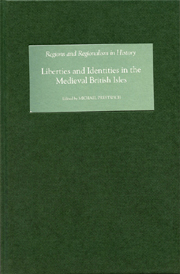Book contents
- Frontmatter
- Contents
- List of maps
- Abbreviations
- Introduction
- 1 States, liberties and communities in medieval Britain and Ireland (c.1100–1400)
- 2 Arbitration and Anglo-Scottish border law in the later middle ages
- 3 Peacekeepers and lawbreakers in medieval Northumberland, c.1200–c.1500
- 4 War, lordship, and community in the liberty of Norhamshire
- 5 The lordship of Richmond in the later middle ages
- 6 ‘Tam infra libertates quam extra’: Liberties and military recruitment
- 7 Neighbours from Hell? Living with Tynedale and Redesdale, 1489–1547
- 8 Striving for Marcher liberties: The Corbets of Caus in the thirteenth century
- 9 Franchises north of the border: Baronies and regalities in medieval Scotland
- 10 The liberties of Ireland in the reign of Edward I
- Index
7 - Neighbours from Hell? Living with Tynedale and Redesdale, 1489–1547
Published online by Cambridge University Press: 12 September 2012
- Frontmatter
- Contents
- List of maps
- Abbreviations
- Introduction
- 1 States, liberties and communities in medieval Britain and Ireland (c.1100–1400)
- 2 Arbitration and Anglo-Scottish border law in the later middle ages
- 3 Peacekeepers and lawbreakers in medieval Northumberland, c.1200–c.1500
- 4 War, lordship, and community in the liberty of Norhamshire
- 5 The lordship of Richmond in the later middle ages
- 6 ‘Tam infra libertates quam extra’: Liberties and military recruitment
- 7 Neighbours from Hell? Living with Tynedale and Redesdale, 1489–1547
- 8 Striving for Marcher liberties: The Corbets of Caus in the thirteenth century
- 9 Franchises north of the border: Baronies and regalities in medieval Scotland
- 10 The liberties of Ireland in the reign of Edward I
- Index
Summary
In 1495, Henry VII abolished Tynedale's liberty status and annexed it to the county of Northumberland. Its inhabitants, often ‘allied with the Scots, the ancient enemies of this realm, have … committed and done, and still daily and nightly commit and do, great and dreadful murders, treasons, robberies, felonies, depredations, riots and other great offences upon the king our sovereign lord's true and faithful liege people and subjects … within the counties of Northumberland, Cumberland and Westmorland, Hexhamshire, the bishopric of Durham and in a part of Yorkshire … [who] cannot be at all secure in their bodies or goods, or even reside in their own houses, but may either be murdered or taken and carried off into Scotland and there ransomed to the great damage of their body and goods and their complete impoverishment forever’. But it was beyond the power of statute to reform the ‘surnames’ of Tynedale. In 1522, John Kite, bishop of Carlisle, the king's agent in the North, confirmed that, along with their fellows of Redesdale (which enjoyed liberty status until 1536), they committed ‘more theft, more extortion … than there is by all the Scots of Scotland’, so that ‘no man which is not in a hold strong hath or may have any cattle or movable in surety through the bishopric till we come within eight miles of Carlisle; all Northumberland likewise’. By this time, his complaints would have made thoroughly familiar reading at Westminster.
- Type
- Chapter
- Information
- Liberties and Identities in the Medieval British Isles , pp. 120 - 140Publisher: Boydell & BrewerPrint publication year: 2008



